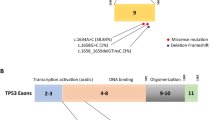Abstract
The proband was a 39-year-old Japanese woman with stage I triple negative breast cancer. Germline BRCA1 and BRCA2 genetic testing revealed the presence of a BRCA1 c.5332G>A (p.Asp1778Asn) variant classified as a VUS in the heterozygous state. She underwent curative surgery and adjuvant chemotherapy for her TNBC, but no intensive follow-up or risk-reducing surgery was performed in contrast to normal practice in a patient with hereditary breast and ovarian cancer syndrome. At postoperative 2 years 6 months, elevation of CA15-3 led to the diagnosis of Stage III high-grade serous ovarian cancer. Studies and information in public databases at the time of the patient’s genetic testing showed only VUS results for c.5332G>A; within the next few years, one pathogenic and one likely pathogenic result were confirmed. Thus, according to a joint consensus recommendation of the ACMG/AMP, c.5332G>A is considered ‘likely pathogenic’. The public database should be checked regularly for VUS results, and practical management should be considered if reliable likely pathogenic or pathogenic reports were added.


Similar content being viewed by others
References
Melchor L, Benitez J (2013) The complex genetic landscape of familial breast cancer. Hum Genet 132:845–863
National Comprehensive Cancer Network (2019) Genetic/familial high-risk assessment: breast and ovarian. Clinical practice guidelines in oncology, Version 3
Lindor NM, Goldgar DE, Tavtigian SV et al (2013) BRCA1/2 sequence variants of uncertain significance: a primer for providers to assist in discussions and in medical management. Oncologist 18(5):518–524
Kurian AW (2020) BRCA1 and BRCA2 mutations across race and ethnicity: distribution and clinical implications. Curr Opin Obstet Gynecol 22:72–78
Hall MJ, Reid JE, Burbidge LA et al (2009) BRCA1 and BRCA2 mutations in women of different ethnicities undergoing testing for hereditary breast-ovarian cancer. Cancer 115:2222–2233
Lai KN, Ho WK, Kang IN et al (2017) Characterization of BRCA1 and BRCA2 variants in multi-ethnic Asian cohort from a Malaysian case-control study. BMC Cancer 17:149
Murray ML, Cerrato F, Bennett RL et al (2011) Follow-up of carriers of BRCA1 and BRCA2 variants of unknown significance: variant reclassification and surgical decisions. Genet Med 13:998–1005
Macklin S, Durand N, Atwal P et al (2018) Observed frequency and challenges of variant reclassification in a hereditary cancer clinic. Genet Med 20(3):346–350
Mersch J, Brown N, Miller SP et al (2018) Prevalence of variant reclassification following hereditary cancer genetic testing. JAMA 320(12):1266–1274
Ahlborn LB, Dandanell M, Steffensen AY et al (2015) Splicing analysis of 14 BRCA1 missense variants classifies nine variants as pathogenic. Breast Cancer Res Treat 150(2):289–298
Minucci A, Lalle M, Leo RD et al (2019) Additional molecular and clinical evidence open the way to definitive IARC classification of the BRCA1 c.5332G>A (p.Asp1778Asn) variant. Clin Biochem 63:54–58
ClinVar [Internet]. National Center for Biotechnology Information. [VCV000055530.7]. https://www.ncbi.nlm.nih.gov/clinvar/variation/VCV000055530.7. Accessed 30 May 2021
Richards S, Aziz N, Bale S et al (2015) Standards and guidelines for the interpretation of sequence variants: a joint consensus recommendation of the American College of Medical Genetics and Genomics and the Association for Molecular Pathology. Genet Med 17(5):405–424
Li H, Laduca H, Pesaran T et al (2020) Classification of variants of uncertain significance in BRCA1 and BRCA2 using personal and family history of cancer from individuals in a large hereditary cancer multigene panel testing cohort. Genet Med 22(4):701–708
Jacobs IJ, Menon U, Ryan A et al (2016) Ovarian cancer screening and mortality in the UK Collaborative Trial of Ovarian Cancer Screening (UKCTOCS): a randomized controlled trial. Lancet 387:945–956
Author information
Authors and Affiliations
Corresponding author
Ethics declarations
Conflict of interest
The authors declare that they have no conflict of interest.
Research involving human participants and/or animals
For this type of study formal consent is not required. This article does not contain any studies with animals performed by any of the authors.
Informed consent
Informed consent was obtained from all individual participants included in the study.
Additional information
Publisher's Note
Springer Nature remains neutral with regard to jurisdictional claims in published maps and institutional affiliations.
About this article
Cite this article
Saita, C., Aruga, T., Adachi, M. et al. Germline variant of BRCA1 c.5332G>A has clinical features of hereditary breast and ovarian cancer syndrome. Int Canc Conf J 11, 12–16 (2022). https://doi.org/10.1007/s13691-021-00512-z
Received:
Accepted:
Published:
Issue Date:
DOI: https://doi.org/10.1007/s13691-021-00512-z




